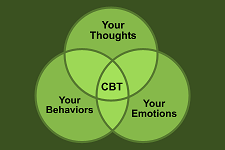94 Parkinson’s and Depression
Based on research by Roseanne Dobkin, et al., 2012, written by Juanita N. Baker, Ph.D..
Are you a caregiver for someone struggling with Parkinson’s disease and perhaps also depression? Caregiving for Parkinson’s disease is stressful, and the patient’s depression adds difficulty. The Caregiver as well as the patient may benefit from extra services.
Psychologist Roseanne Dobkin and colleagues examined the effectiveness of cognitive behavioral therapy (CBT) and facilitating factors for reducing depression and ameliorating symptoms in Parkinson’s disease. Comparing different groups, patients either received CBT therapy or did not and their caregivers received 4 educational sessions or did not. The researchers measured patient’s depression before and after the therapy as well as other relevant physical symptoms of Parkinson’s.
Results suggest that caregiver participation in treatment positively influenced the patient’s acute depression response to Parkinson’s disease. The skills-based nature of CBT treatment, focusing on identifying and analyzing thoughts and behaviors, and emphasizing the importance of homework and practice between sessions (and after therapy has ended) may make CBT especially well suited for the caregivers to aid in the patient’s treatment.
For those with Parkinson’s disease, Cognitive Behavior Therapy for depression is helpful, especially when caregivers can learn in their own sessions to better manage their feelings and provide help for their loved ones.
References:
Dobkin, Roseanne D.; Rubino, Jade Tiu; Allen, Lesley A.; Friedman, Jill; Gara, Michael A.; Mark, Margery H.; Menza, Matthew. (2012). Predictors of treatment response to cognitive-behavioral therapy for depression in Parkinson’s disease. Journal of Consulting and Clinical Psychology, 80(4), 694-699. doi: 10.1037/a0027695
Dobkin, R. D., Menza, M., Allen, L. A., Gara, M. A., Mark, M. H., Tiu, J.,. . Friedman, J. (2011). Cognitive-behavioral therapy for depression in Parkinson’s disease: A randomized, controlled trial. American Journal of Psychiatry, 168, 1066–1074. doi:10.1176/appi.ajp.2011.10111669





